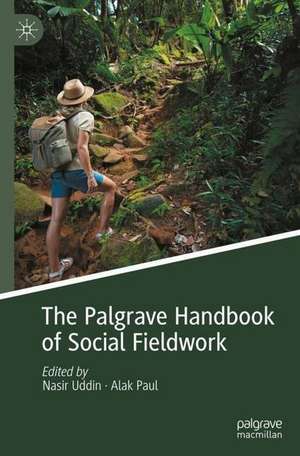The Palgrave Handbook of Social Fieldwork
Editat de Nasir Uddin, Alak Paulen Limba Engleză Hardback – 15 apr 2023
Preț: 1395.47 lei
Preț vechi: 1701.79 lei
-18% Nou
Puncte Express: 2093
Preț estimativ în valută:
267.03€ • 279.50$ • 222.25£
267.03€ • 279.50$ • 222.25£
Carte tipărită la comandă
Livrare economică 31 martie-14 aprilie
Preluare comenzi: 021 569.72.76
Specificații
ISBN-13: 9783031136146
ISBN-10: 3031136144
Pagini: 462
Ilustrații: XXV, 462 p. 27 illus.
Dimensiuni: 155 x 235 mm
Greutate: 0.86 kg
Ediția:2023
Editura: Springer International Publishing
Colecția Palgrave Macmillan
Locul publicării:Cham, Switzerland
ISBN-10: 3031136144
Pagini: 462
Ilustrații: XXV, 462 p. 27 illus.
Dimensiuni: 155 x 235 mm
Greutate: 0.86 kg
Ediția:2023
Editura: Springer International Publishing
Colecția Palgrave Macmillan
Locul publicării:Cham, Switzerland
Cuprins
1. Methodological issues in social research: Experience from the 21st century.- 2. An active partner in disgraceful context: research, surveillance and risk in the Chittagong Hill Tracts.- 3. Researching Garo Death Rites (reprint with revision).- 4. Negotiating the tyrannies of fieldwork in Africa: A Nigerian experience.- 5. Trial by fire: Reflections on fieldwork in Nagaland, Northeast India. 6. Encounters in the field: The influence of emotions on data.- 7. Developing relationships over many years: Under investigated but important types of qualitative Research.- 8. Sick in the Field: Illness and inter-being encounters in anthropological fieldwork.- 9. At the organ bazaar of Bangladesh: In search of kidney sellers (reprint with revision). 10. “Can we talk about surrogacy?” Legal precariousness and the perils of qualitative research in the biomedical Context.- 11. Qualitative ‘fieldwork’ in health geographic research: self-reports from Bangladesh.- 12. Adolescent drug abuse in Connecticut private high schools: Zero tolerance, contextual peer Influence, and deterrence effectiveness.- 13. Researchers’ dilemmas and challenges in qualitative fieldwork with climate-vulnerable communities.- 14. Risks and challenges in fieldwork on gender-based violence: Identity, social taboo and culture.- 15. Rethinking ethnographic research as ‘gendered and en-casted labour’: Reflections from researching caste and partition-induced forced-migration in a non-metropolitan city of West Bengal.- 16. Photovoice as a method for women’s empowerment in domestic violence: a reflexive account.- 17. Working with opposite gender: Experience of doing fieldwork among rural women in Bangladesh.- 18. Between an activist and academic: Contested (re)positioning in refugee research.- 19. Moving research methods to the field: Challenges and Lessons learned across African contexts.- 20. Entry, access, bans and returns: Reflections on positionality in field research on Central Asia’s ethnic minorities.- 21. Doing ethnography on sexuality among Young Men in Dhaka, Bangladesh: How Has Reflexivity Helped? - 22. A native anthropologist’s positionality of being insider/outsider: A reflective account of doing ethnographic research in Nepal.- 23. Recruitment of participants from vulnerable groups for social research: Challenges and solutions.- 24. Navigating Archival Readings of Rural Technology.- 25. Challenges of social research: Way forward.
Notă biografică
Nasir Uddin is a cultural anthropologist based in Bangladesh and Professor of Anthropology at the University of Chittagong. He is the author of The Rohingya: An Ethnography of ‘Subhuman’ Life (2020) and Voices of the Rohingya People: A Case of Genocide, Ethnocide and ‘Subhuman’ Life (Palgrave Macmillan, 2022).
Alak Paul is Professor in the Department of Geography and Environmental Studies, at the University of Chittagong. He is the co-editor of Geography in Bangladesh: Concepts Methods and Applications (2019) and the author of HIV/AIDS in Bangladesh: Stigmatized People, Policy and Place (2020).
Alak Paul is Professor in the Department of Geography and Environmental Studies, at the University of Chittagong. He is the co-editor of Geography in Bangladesh: Concepts Methods and Applications (2019) and the author of HIV/AIDS in Bangladesh: Stigmatized People, Policy and Place (2020).
Textul de pe ultima copertă
The handbook offers epistemologically and ontologically important personal accounts of academic and professional researchers having long-term intensive, comprehensive and ethnographic fieldwork in various social settings and versatile regional contexts across the globe. The accounts are cross-disciplinary including anthropology, sociology, geography, political sciences, gender studies, forestry & environmental studies, economics, and international relations. These are also trans-regional covering the globe including South Asia, Southeast Asia, Africa, Europe, Latin America and North America. The book offers a comprehensive portrait of multifaceted challenges that social researchers experience while doing fieldwork in various social settings. The accounts provide both challenges of doing fieldwork in the 21st century and the ways how to address/redress them in the field by complying with the codes of ethics, and the politics of fieldwork. Readers could enormously benefit from the handbook by understanding methodological issues from both disciplinary relevance and regional specificity across time and spaces.Nasir Uddin is a cultural anthropologist based in Bangladesh and Professor of Anthropology at the University of Chittagong. He is the author of The Rohingya: An Ethnography of ‘Subhuman’ Life (2020) and Voices of the Rohingya People: A Case of Genocide, Ethnocide and ‘Subhuman’ Life (Palgrave Macmillan, 2022).
Alak Paul is Professor in the Department of Geography and Environmental Studies, at the University of Chittagong. He is the co-editor of Geography in Bangladesh: Concepts Methods and Applications (2019) and the author of HIV/AIDS in Bangladesh: Stigmatized People, Policy and Place (2020).
Alak Paul is Professor in the Department of Geography and Environmental Studies, at the University of Chittagong. He is the co-editor of Geography in Bangladesh: Concepts Methods and Applications (2019) and the author of HIV/AIDS in Bangladesh: Stigmatized People, Policy and Place (2020).
Caracteristici
Provides case studies on dealing with the practical, political and ethical issues of conducting immersive fieldwork Explores the multi-disciplinary and cross-regional specificity of methodological issues in social science Demonstrates the diversity of personal experience, different locations, and varied topics on research undertaken
